Question-------------------------
Followup To
Question -
Hi, I amplants. My stocking scheme is going to be 2 angelfish, 3 swordtails, and 6 cory cats. I was woundering how many watts of lighting do I need, and how do you siphon the gravel if it is full of plants without disturbing their roots. oh yeah, how do you attach plants like jave moss or Java Fern to rocks or driftwood, and what plants would you recomend for my setup? Any advice would be apreciated.
Sincerely, Hans Anderson
Answer -
Hello Hans!
I am so glad you have decided to keep live plants in your aquarium! Aquatic plants are the most wonderful thing... They do so much good when added to an aquarium. Aquatic plants remove nitrate and phosphates, and even absorb ammonia in return they give off oxygen. Plants also benefit fish by not only keeping their water quality good, but provide great hiding places, spawning sites and make any fish feel more secure and relaxed in his habitat.
Aquatic gardens are quite easy to keep. But just like with terrestrial plants, when you first start out you should keep only hardier species. Later on as you get the hang of things you can add more delicate species and try your hand at growing them. The most common plants usually available to most aquarists include Hornwort, Anacharis, Java Fern, Java moss, Ludwigia, Anubias, Najas, Watersprite and tiger lotus, these are just a few of the easy-to keep species you can start with. These species also do well even under the standard florescent lighting that usually comes with your tank. Many plants can be kept with the standard lighting that comes with most tanks but they may never do as good as those planted under a higher wattage special 'plant' bulb. By these means, you may want to replace your current bulb with one designed specifically for live plants. Oh yes, and for the average planted aquarium, a rough estimate of about 2 watts per gallon should work quite well. This wattage per gallon ratio should satisfy the needs of the plants but without providing far too much light than they can use. You should insure your aquatic garden gets enough but not too much light. A consistant daylight period of 12 hours is good for most plants. Leaving the light on more than that might encourage algae to take a hold. Leaving the light on longer to try to make plants grow better with a poor bulb won't work. A higher wattage will. ;-)
A basic aquarium garden needs only a good working (but gentle) filter, a good lighting system, nutrients, and patience from the fishkeeper/aquatic gardner to thrive. I currently have two thickly planted aquariums and plan to make most of my tanks into little gardens. Generally with hardy plants, you shouldn't need any special plant substrate or co2 injection. These are fine if you really need them. But the average planted tank doesn't, at least in my experience. I have added fertilizers on occasion, but you must use these with caution. I have found the waste my fish leave is enough nutrition for the plants to thrive.
Just like with fish, aquatic plants need water changes to remain healthy, to replenish lost minerals and nutrients in your tap water. I have found a 1/3 once or twice a week is ideal...But you must always adjust according to how much you feed or your fish load. Which by the way, you have selected quite a interesting group of fishes for a planted tank they should do wonderful together and look great swimming among the plants. When you do your weekly/twice weekly water changes, you may need to use a smaller siphon end to get around the plants without disturbing them or pulling them out of the substrate. Pushing the gravel tube too far may chop any plant roots and damage the main plant. The best thing to do is push down only slightly in the gravel. Never jam it down all the way. You can usually avoid siphoning around the plants because they generally use the mulm as a nutrient source. You should ever let your gravel get too clogged of course. Of course aquariums completely covered in plants are impossible to siphon. Any siphoning would destroy the plants but with that sufficient of a number, the gravel should be healthy anyways.
When you get your plants home, usually the main plant consists of actually several stems, held together by a rubber band or a metal strip. Carefully untagle the plants and take off the metal or rubber band. When planting it is best to seperate each individual plant a little from the other to give the plant room to breath and get settled in. Push it gently into the gravel and gently push the gravel around it to settle it in there. When you first plant them they often have a tendancy to come loose under seemingly the slightest movement made near them. But with time and good conditions they will sprout roots and achor themselves firmly to the gravel bed. And with time, grow and get bushy and tall and even multiply. Java Fern and java moss are great plants for a low-light aquarium. These two plants are often secured to a piece of driftwood or rocks by wrapping the plant with black or clear thread. Java fern can be wrapped at it's base around the rock or driftwood and allowed time to naturally attach itself to the surface. Java moss can be wrapped just the same and will in time attach itself to the rock or driftwood. The thread usually rots overtime and dissapears after awhile but by that time the plants will be growing securely on the wood.
Your best sucess as an aquatic gardener is plant heavy from the start. Algae won't have a chance to take hold when there are enough plants to use up the excess light and nutrients. But the best advice is to start simple, with easy plants and get it right from the start. As long as you keep up with a consistant maintanance routine with weekly water changes. Your sucess as an aquatic gardener should be great..~
I really hope this helps! Let me know if I haven't covered something about aquatic plants or if you have anymore questions I would be happy to help...
My best wishes!!
Happy fishkeeping/ aquatic Gardening!
Karen~
Thank you so much for all of your great advice on Aquatic plants Karen, it was much appreciated, and got me inspired to set my tank up. I just had a quick question about one of my tiger barbs that I have. Whenever I feed him, it seems like afterward, he has trouble swimming. He will kind of float to the top of the tank. I was woundering, do you think that it is because he swallows too much air at the surface when he grabs the flakes, or maybe because he is sick? I Know this dosn't relate to plants but I was just concerned for his health and what I should do for him. By the way he is in my 10 gallon with 2 other buddys of his own kind.
AnswerHi Hans, you're very welcome!!!!! :-)
It sounds like your Tiger barb has a swim bladder disorder. The swim bladder is a gas-filled sack running somewhat along a fish's spine, this sac helps a fish maintain his normal bouyancy. But when something goes wrong with the swim bladder a fish can become very unbalanced, sometimes even to the point of swimming upside down uncontrollably. Causes such as when a fish eats lots of dry food before it even absorbs water, that food goes into his digestive tract and absorbs water, expanding twice it's size... Sometimes even the fish bloats slightly and the pressure presses on the swim bladder causing equalibrium problems. Some fish are more prone to this problem after they eagerly gobble up dry food. Not certain species but each individual fish. I have seen this happen with bettas and goldfish, some bettas had this tendancy and some goldfish also did. But not every one. The best solution to this is to simply pre-soak the flakes in a small cup before pouring it in to your tigers. The food will have preabsorbed water before entering the fish and will also decrease the likelihood of him swallowing extra air in his eagerness which may likely be contributing to his problem. Usually a fish burps after eating but if he isn't that might be causing him problems too. Just try presoaking his food for about a minute or more if you are feeding harder food than flakes.
I hope this helps! Best of luck to you!!!!!
~Happy fishkeeping---Happy Holidays!~
Karen~*~

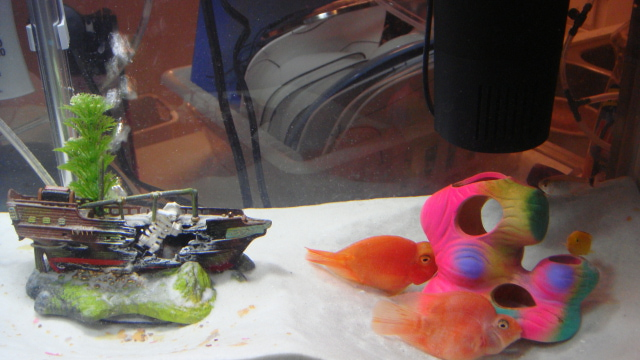 Problem on my parrot fish
QuestionQUESTION: Last Saturday, i noticed my 2 parrot
Problem on my parrot fish
QuestionQUESTION: Last Saturday, i noticed my 2 parrot
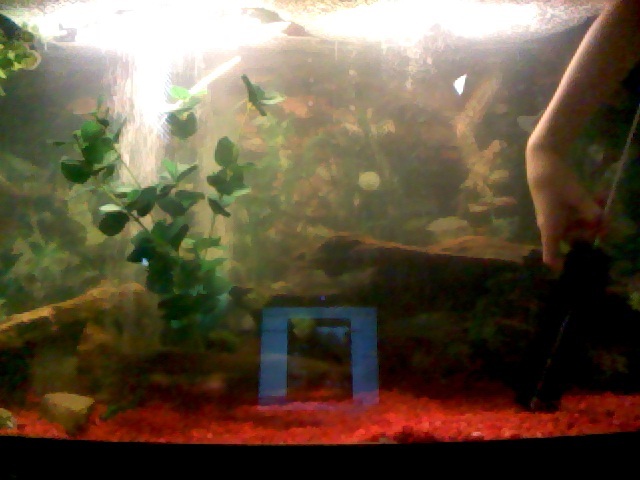 important please help
Question
catfish
hello I have a 12 inch yellow bullhead
important please help
Question
catfish
hello I have a 12 inch yellow bullhead
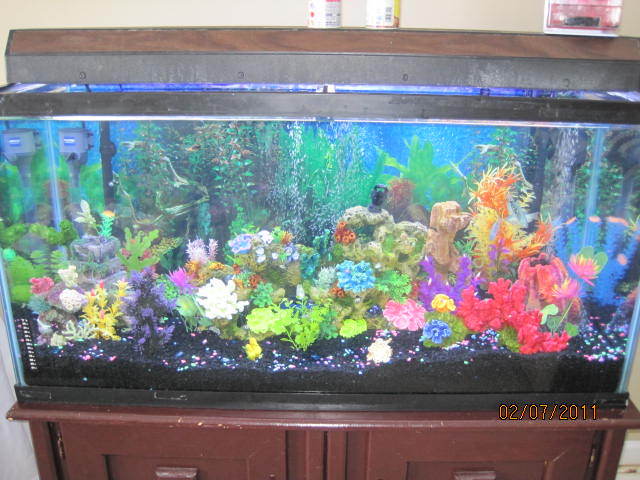 high PH levels
Question
Our 90 Gallon Tank
We recently set up at 90 ga
high PH levels
Question
Our 90 Gallon Tank
We recently set up at 90 ga
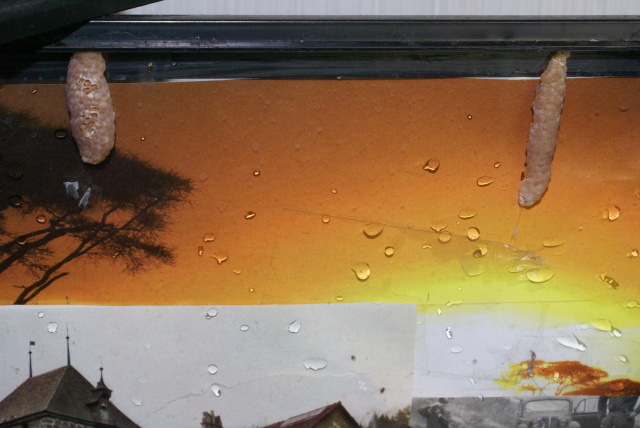 wierd egg sack in newt tank
Question
eggs
I have a firebelly newt tank, with apple
wierd egg sack in newt tank
Question
eggs
I have a firebelly newt tank, with apple
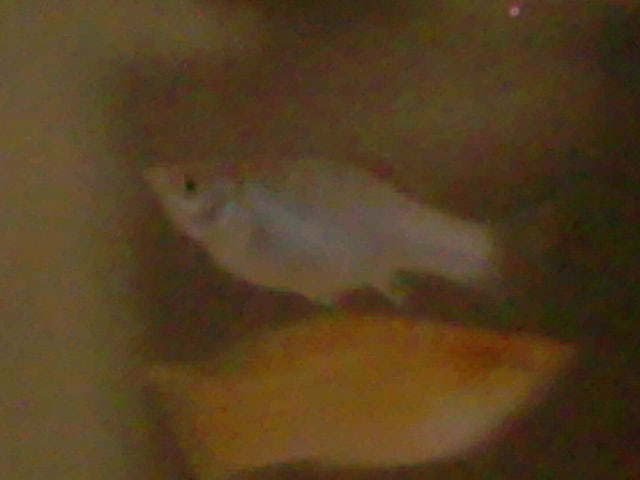 is my silver molly pregnant
Question
QUESTION: i got another silver
is my silver molly pregnant
Question
QUESTION: i got another silver